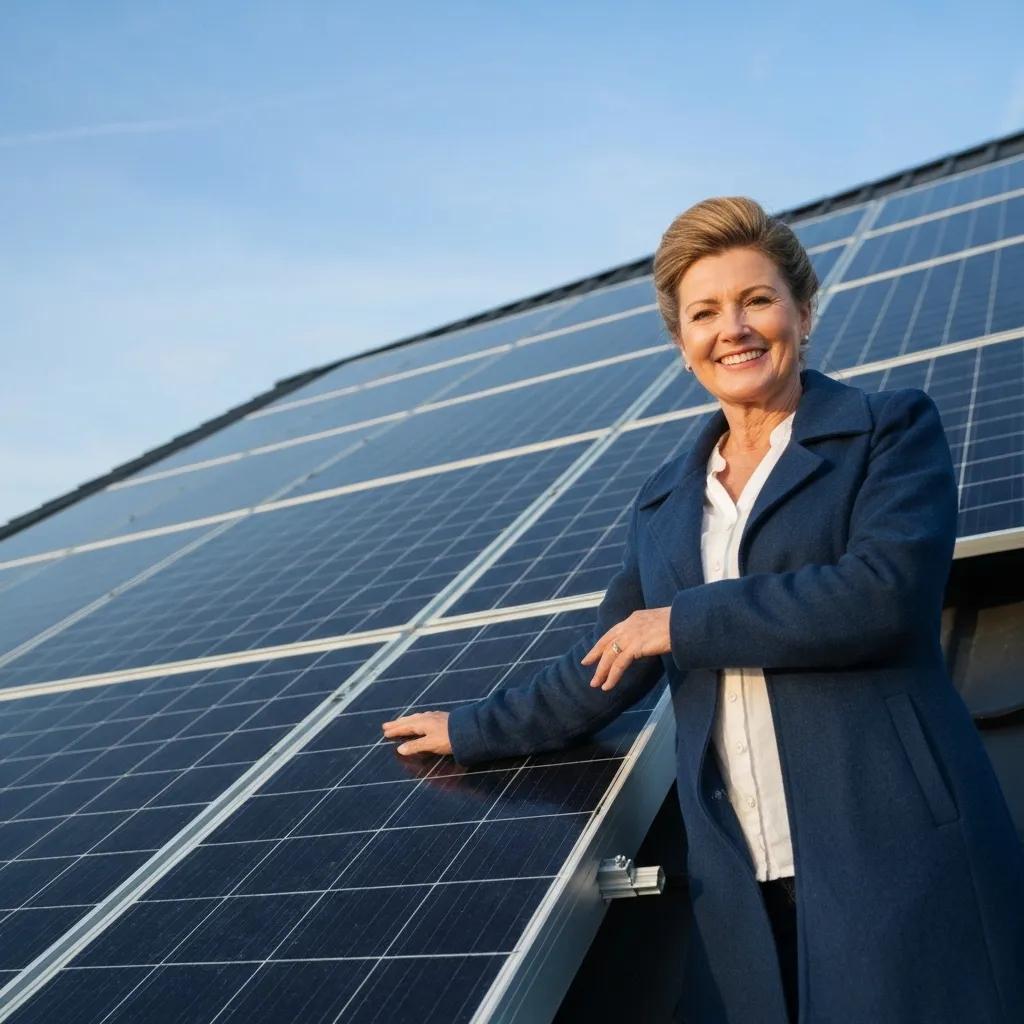
Solar Panel Financing in Nevada: Loans, Leases & PPAs ComparedSolar Panel Financing: Loans, Leases, and PPAs Explained for Nevada Homeowners and Businesses
Going solar in Nevada can dramatically cut your electricity bills, but picking the right financing is key to unlocking the biggest savings. This guide breaks down solar loans, leases, and power purchase agreements (PPAs). We’ll compare how they work, highlight important Nevada and federal incentives, explain what you’ll need to apply, and show you why working with Vegas Solar LLC makes the whole process smooth sailing. You’ll discover:
- How solar loans, leases, and PPAs function, along with their pros and cons
- How to compare interest rates, upfront costs, maintenance responsibilities, and your ownership goals
- The 30% federal tax credit and Nevada’s specific rebates and net-metering policies
- Estimates for system costs, how long it takes to break even, and your return on investment (ROI)
- What you need to qualify and the steps involved in applying
- The unique advantages of choosing Vegas Solar LLC for your financing
What Are the Main Ways to FinanceSolar Panels?
Solar financing makes it possible for homeowners and businesses to get solar power without paying the full cost upfront. Instead, you can spread the investment across different plans like loans, leases, or PPAs. Each option balances owning the system, initial expenses, monthly payments, and who handles maintenance, so you can find the best fit for your financial situation.
How Do Solar Loans Work and What Are Their Advantages?

A solar loan is a type of credit that covers the cost of your solar equipment and installation. You repay it over a set period with interest. When you get a solar loan, you own your panels outright. This means you can claim the 30% federal SolarInvestmentTax Credit under the Inflation Reduction Act. Plus, you build home equity while turning your electricity expenses into predictable loan payments.
Key advantages include:
- Full ownership, which boosts your home’s value and makes you eligible for tax credits
- A variety of loan options, including home-equity loans, unsecured personal loans, and lien-free choices
- Potential for zero-down payment offers and competitive interest rates
Owning your solar system through a loan means greater long-term savings and direct control over how your system performs and its warranties.
What Is a SolarLease and How Does It Compare to Buying?

A solarlease is essentially renting a solar system for a monthly fee. With a lease, the company that owns the system handles all the maintenance and performance risks. Unlike a loan, you don’t own the equipment, but you do get predictable energy costs without needing a large upfront payment.
Key aspects of a solarlease:
- No initial deposit or need to buy the equipment
- The provider takes care of maintenance, monitoring, and any necessary repairs
- Monthly lease payments might increase over time due to inflation clauses
- You won’t qualify for federal tax credits or see a direct increase in your home’s value from the system
Leasing makes it easy to go solar with minimal financial risk. Loans, on the other hand, offer greater financial returns for those who want to own their system and take advantage of incentives.
What Is a Power Purchase Agreement (PPA) and How Does It Work?
A PPA is a long-term contract where a solarcompany installs and owns the panels on your property. You then pay only for the electricity the system generates, at a rate that’s agreed upon beforehand per kilowatt-hour. This setup means you don’t have to worry about installation costs or maintenance, and you get stable energy pricing.
Key features of a PPA:
- No upfront costs for the equipment or installation
- A fixed electricity rate that’s often lower than what your utilitycompany charges
- The provider manages system performance and upkeep
- Since you don’t own the system, you can’t claim tax credits
PPAs are a great choice for those who want to save money on energy right away without the responsibilities of ownership.
How Do Solar Loans, Leases, and PPAs Differ?
Here’s a breakdown of the main differences to help you decide which option best suits your ownership goals, budget, and maintenance preferences.
Choosing a loan maximizes your incentives and long-term savings. Leases and PPAs make it easier to get started and simplify system upkeep.
How Can You Pick the Best Solar FinancingOption for Your Needs?
The best financing path for you depends on your financial goals, credit history, and whether you prefer owning the system or having a simpler, hands-off approach.
What Financial Goals Should Guide Your Decision?
Think about whether you need immediate relief on your monthly bills or if you’re more focused on long-term investment returns. Owning your system with a loan gives you access to tax credits and increases your property value. Leases and PPAs, on the other hand, focus on minimal upfront costs and predictable monthly payments.
How Do Interest Rates and Loan Terms Impact Solar Loans?
The interest rate (typically 3.5–7.5% APR) and the loan term (10–25 years) directly affect your monthly payment and the total amount of interest you’ll pay. Longer terms mean lower monthly payments but more interest over time, while shorter terms help you save money faster.
What Are the Differences in Maintenance and Warranties for Leases and PPAs?
Both lease and PPA agreements usually include comprehensive system maintenance, coverage for inverter replacements, and performance guarantees. This means you won’t have to pay for repairs and can expect consistent energy production.
When Is a PPA the Most Suitable Financing Option?
A PPA is an excellent choice for customers who want zero responsibility for equipment, prefer stable electricity rates, and don’t need to claim tax credits or increase their home’s value. This is often ideal for businesses with limited upfront capital.
What Local and Federal Incentives Can Lower Your Solar Financing Costs?
Taking advantage of government incentives can significantly speed up how quickly your solarinvestment pays for itself and maximize your overall return.
How Does the Federal SolarTax Credit (ITC) Reduce Solar Panel Costs?
The InvestmentTax Credit (ITC) allows you to deduct 30% of your total solar systemcost from your federal income taxes through 2032. This effectively lowers the amount you need to finance or pay out-of-pocket.
The InvestmentTax Credit (ITC) offers a 30% reduction of the total solar systemcost through 2032, which can be subtracted from federal income taxes.
U.S. Department of Energy, Solar EnergyTechnologies Office (2024)
What Nevada-Specific Solar Incentives and Rebates Are Available?
Nevada’s utility companies and local governments offer additional rebates and incentives based on system performance. Net-metering policies credit you for excess energy sent back to the grid at retail rates, and some counties provide cash rebates per kilowatt installed.
How Does Net Metering Affect Your Solar Savings in Nevada?
Net metering allows your solar system to send excess electricity back to the grid, effectively spinning your meter backward. You receive credits for this exported power, which can then be used to offset your future electricity bills. By exporting surplus energy, you boost your ROI and shorten the time it takes to break even.
Net metering allows surplus solar generation to yield credits that offset future utility charges, maximizing ROI and shortening the payback period.
EnergySage, “Net MeteringExplained” (2024)
What Is the Cost of Solar with Financing and What Are the Expected Savings?
When you finance a solar project, the equipment costs, loan interest or service fees, and incentive savings all combine to create clear financial benefits over the system’s lifespan.
What Is the Typical Cost of Solar Panels After Financing and Incentives?
After applying the 30% federal tax credit and any Nevada rebates, a 6 kW system financed with a loan typically costs around $12,000–$15,000 over 20 years. This is compared to an upfront cashprice of about $18,000.
How Can You Calculate Your SolarPayback Period and Return on Investment?
To estimate your payback period, divide your net financed cost by your average annual electricity bill savings. Online solar calculators can help by factoring in your location’s sunlight, local electricity rates, and financing terms to project your ROI and when you’ll break even.
What Are the Monthly Payment Expectations for Loans, Leases, and PPAs?
Loan payments essentially convert your electricity bills into an investment that builds equity. Fixed lease and PPA rates make budgeting simpler.
How Do You Apply for Solar Financing and What Are the Qualification Requirements?
Following the right application steps ensures that your solar project is approved and installed without delays.
What Is the Solar Loan Application Process?
- Inquiry and Estimate: Request a free quote and a site assessment.
- Credit Review: Provide your credit score and income information.
- Approval and Document Signing: Finalize the loan terms and sign the necessary paperwork.
- InstallationScheduling: Arrange a date for the panel installation and inspection.
- System Activation: Complete the utility interconnection and get your system up and running.
What Credit Scores and Financial Criteria Are Needed for Solar Loans?
Most lenders require a credit score of 650 or higher and proof of stable income. If you use a secured home-equity loan, the credit score requirements might be lower because the loan is backed by your home.
How Do SolarLease and PPA Agreements Work Contractually?
Leases and PPAs are service contracts that outline the agreement details. They typically specify the contract length (20–25 years), performance guarantees, how payments might adjust over time (inflation escalators), and options for transferring ownership at the end of the contract term.
What Are the Benefits of Financing Solar Panels Through Vegas Solar LLC?
Choosing a local solar expert means you’ll get personalized service, clear financing options, and a smooth installation process right here in Las Vegas and the surrounding areas.
How Does Vegas Solar LLC Support Customers with Free Consultations?
Vegas Solar LLC offers free, no-obligation consultations to review your energy use, check your roof’s suitability, and discuss financing options. We’ll guide you toward the most cost-effective solution for your home or business. Reach out to us for a complimentary consultation.
What Financing Options Does Vegas Solar LLC Offer in Las Vegas, Nevada?
As a comprehensive solarinstaller, Vegas Solar LLC works with leading financial partners to offer customized solar loans, leases, and PPAs. We tailor these options to your specific credit situation and savings objectives.
How Have Local Customers Benefited from Vegas Solar’s Financing Solutions?
Our positive reviews on the Better Business Bureau highlight how local families and businesses have slashed their monthly bills by up to $200 and recouped their installation costs in as little as 6–8 years. See Vegas Solar LLC’s BBB Profile
What Are the Most Common Questions About Solar Panel Financing?
People often have questions about the costs, value, and contract details involved in solar financing. Here’s some information to help you make an informed decision in Nevada.
What Are the Pros and Cons of Solar Loans vs. Leases?
Solar loans give you full ownership, eligibility for tax credits, and the highest long-term savings, but they do require credit approval and potentially a down payment. Leases require minimal upfront cash and shift maintenance responsibilities to the provider, but you don’t get ownership benefits or tax credits.
Can Solar Panels Increase My Home’s Value?
Yes, owned solar systems typically increase property values by 3–4%. Buyers see the appeal of lower energy bills and eco-friendly features, making solarownership a significant boost to your home’s value.
Owned solar systems typically raise property values by 3–4%, as buyers recognize lower energy costs and greener credentials.
Zillow, “Does SolarIncrease Home Value?” (2024)
How Does a Power Purchase Agreement Affect My Electricity Bills?
With a PPA, you replace your standard utility charges with a fixed per-kWh rate, which is often 10–20% lower than grid electricity. This results in predictable monthly costs without the hassle of system maintenance.
Are There Prepayment Penalties or Hidden Fees in Solar Loans?
Most solar loans allow you to pay them off early without any penalties. However, secured home-equity loans might have associated closing costs. Reputable providers will clearly outline all origination and administrative fees upfront.
How Long Does It Take to See Savings from Solar Financing?
You’ll typically start seeing savings immediately as your solar production offsets your utility rates. Most financed solar systems pay for themselves within 6–12 years, depending on your financing terms, available incentives, and how much energy you use.
Whether you own or lease your solar panels, choosing the right financing plan can turn your electricity expenses into a smart investment while contributing to a greener future. Partnering with Vegas Solar LLC means you’ll have expert guidance, help optimizing local incentives, and ongoing support from your first consultation to your system’s activation. Make the smart move to solar with confidence and start saving today.